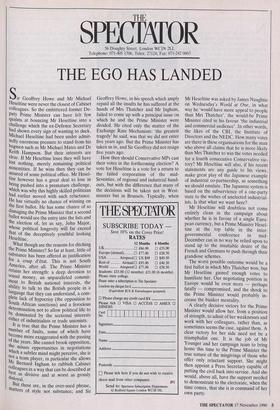56 Doughty Street, London WC1N 2LL Telephone: 071-405 1706; Telex:
27124; Fax: 071-242 0603
THE EGO HAS LANDED
Sir Geoffrey Howe and Mr Michael Heseltine were never the closest of Cabinet colleagues. So the embittered former De- puty Prime Minister can have felt few qualms at bouncing Mr Heseltine into a challenge which the ex-Defence Secretary had shown every sign of wanting to duck. Michael Heseltine had been under admit- tedly enormous pressure to stand from his bagmen such as Mr Michael Mates and Dr Keith Hampson. But their interests are clear. If Mr Heseltine loses they will have lost nothing, merely remaining political nonentities. If he wins then they can be assured of some political office. Mr Hesel- tine however has a great deal to lose in being pushed into a premature challenge, Which was why this highly skilled politician had earlier moved with such reluctance. He has virtually no chance of winning on the first ballot. He has some chance of so damaging the Prime Minister that a second ballot would see the entry into the lists and the election of, let us say, John Major, Whose political longevity will far exceed that of the deceptively youthful looking Heseltine.
What though are the reasons for ditching the Prime Minister? So far at least, little of substance has been offered as justification for a coup d'etat. This is not South America, after all. The Prime Minister retains her strength: a deep devotion to sound money, an unparalleled commit- ment to British national interests, the ability to talk to the British people in a language that they can understand, a com- plete lack of hypocrisy (the opposition to South African sanctions) and a ferocious determination not to allow political life to be dominated by the sectional interests either of industrialists or trade unionists.
It is true that the Prime Minister has a number timber of faults, some of which have become more exaggerated with the passing Of the years. She cannot brook opposition, she misses opportunities in negotiations which a subtler mind might perceive, she is not a team player, in particular she allows Mr Bernard Ingham to rubbish Cabinet colleagues in a way that can be described at best as divisive and at worst as grossly disloyal.
But these are, in the over-used phrase, matters of style not substance; and Sir Geoffrey Howe, in his speech which amply repaid all the insults he has suffered at the hands of Mrs Thatcher and Mr Ingham, failed to come up with a principal issue on which he and the Prime Minister were divided. He cited only the matter of the Exchange Rate Mechanism: 'the greatest tragedy' he said, was that we did not enter five years ago. But the Prime Minister has taken us in, and Sir Geoffrey did not resign five years ago.
How then should Conservative MPs cast their votes in the forthcoming election? A vote for Heseltine is a vote for a return to the failed corporatism of the mid- Seventies, of regional and industrial hand- outs, but with the difference that many of the decisions will be taken not in West- minster but in Brussels. Typically, when Mr Heseltine was asked by James Naughtie on Wednesday's World al One, in what way he 'would have more appeal to people than Mrs Thatcher', the would-be Prime Minister cited in his favour 'the industrial and commercial audience'. In other words, the likes of the CBI, the Institute of Directors and the NEDC. How many vote,s are there in these organisations for the man who above all claims that he is more likely than Mrs Thatcher to win the votes needed for a fourth consecutive Conservative vic- tory? Mr Heseltine will also, if his recent statements are any guide to his views, make great play of the Japanese example of industrial co-partnership, as something we should emulate. The Japanese system is based on the subservience of a one-party state to the wishes of unelected industrial- ists. Is that what we want here?
Mr Heseltine will doubtless not come entirely clean in the campaign about whether he is in favour of a single Euro- pean currency, but a Prime Minister Hesel- tine at the top table in the inter- governmental conference in mid- December can in no way be relied upon to stand up to the insatiable desire of the French and Germans to push through their grandiose schemes.
The worst possible outcome would be a first ballot in which Mrs Thatcher won, but Mr Heseltine gained enough votes to humiliate her. Our negotiating position in Europe would be even more — perhaps fatally — compromised, and the shock to the Prime Minister would probably in- crease the bunker mentality.
A clearly decisive victory for the. Prime Minister would allow her, from a position of strength, to admit of her weaknesses and work with her colleagues, rather than, as sometimes seems the case, against them. A clear victory for her side need not be a triumphalist one. It is the job of Mr Younger and her campaign team to bring home this time to the Prime Minister the true nature of the misgivings of those who offer only reluctant support. She might then appoint a Press Secretary capable of putting the civil back into service. And she would, above all, have the support needed to demonstrate to the electorate, when the time comes, that she is in command of her own party.























































 Previous page
Previous page